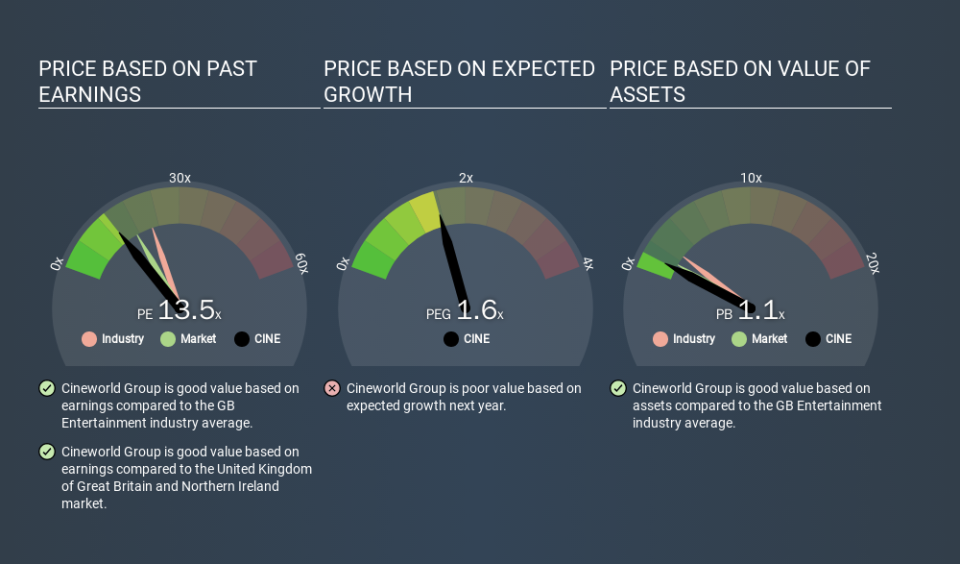Is Cineworld Group plc's (LON:CINE) P/E Ratio Really That Good?

Today, we'll introduce the concept of the P/E ratio for those who are learning about investing. To keep it practical, we'll show how Cineworld Group plc's (LON:CINE) P/E ratio could help you assess the value on offer. What is Cineworld Group's P/E ratio? Well, based on the last twelve months it is 13.49. That means that at current prices, buyers pay £13.49 for every £1 in trailing yearly profits.
See our latest analysis for Cineworld Group
How Do You Calculate A P/E Ratio?
The formula for P/E is:
Price to Earnings Ratio = Price per Share (in the reporting currency) ÷ Earnings per Share (EPS)
Or for Cineworld Group:
P/E of 13.49 = £2.69 (Note: this is the share price in the reporting currency, namely, USD ) ÷ £0.20 (Based on the trailing twelve months to June 2019.)
Is A High Price-to-Earnings Ratio Good?
A higher P/E ratio means that buyers have to pay a higher price for each £1 the company has earned over the last year. All else being equal, it's better to pay a low price -- but as Warren Buffett said, 'It's far better to buy a wonderful company at a fair price than a fair company at a wonderful price.
How Does Cineworld Group's P/E Ratio Compare To Its Peers?
The P/E ratio indicates whether the market has higher or lower expectations of a company. We can see in the image below that the average P/E (22.0) for companies in the entertainment industry is higher than Cineworld Group's P/E.
Cineworld Group's P/E tells us that market participants think it will not fare as well as its peers in the same industry. Since the market seems unimpressed with Cineworld Group, it's quite possible it could surprise on the upside. If you consider the stock interesting, further research is recommended. For example, I often monitor director buying and selling.
How Growth Rates Impact P/E Ratios
When earnings fall, the 'E' decreases, over time. That means even if the current P/E is low, it will increase over time if the share price stays flat. Then, a higher P/E might scare off shareholders, pushing the share price down.
Cineworld Group had pretty flat EPS growth in the last year. But over the longer term (5 years) earnings per share have increased by 1.3%. And it has shrunk its earnings per share by 17% per year over the last three years. This growth rate might warrant a low P/E ratio. So it would be surprising to see a high P/E.
Don't Forget: The P/E Does Not Account For Debt or Bank Deposits
Don't forget that the P/E ratio considers market capitalization. So it won't reflect the advantage of cash, or disadvantage of debt. The exact same company would hypothetically deserve a higher P/E ratio if it had a strong balance sheet, than if it had a weak one with lots of debt, because a cashed up company can spend on growth.
Such expenditure might be good or bad, in the long term, but the point here is that the balance sheet is not reflected by this ratio.
How Does Cineworld Group's Debt Impact Its P/E Ratio?
Cineworld Group's net debt is 83% of its market cap. If you want to compare its P/E ratio to other companies, you should absolutely keep in mind it has significant borrowings.
The Verdict On Cineworld Group's P/E Ratio
Cineworld Group trades on a P/E ratio of 13.5, which is below the GB market average of 17.1. It's good to see EPS growth in the last 12 months, but the debt on the balance sheet might be muting expectations.
Investors should be looking to buy stocks that the market is wrong about. If it is underestimating a company, investors can make money by buying and holding the shares until the market corrects itself. So this free report on the analyst consensus forecasts could help you make a master move on this stock.
Of course, you might find a fantastic investment by looking at a few good candidates. So take a peek at this free list of companies with modest (or no) debt, trading on a P/E below 20.
If you spot an error that warrants correction, please contact the editor at editorial-team@simplywallst.com. This article by Simply Wall St is general in nature. It does not constitute a recommendation to buy or sell any stock, and does not take account of your objectives, or your financial situation. Simply Wall St has no position in the stocks mentioned.
We aim to bring you long-term focused research analysis driven by fundamental data. Note that our analysis may not factor in the latest price-sensitive company announcements or qualitative material. Thank you for reading.

 Yahoo Finance
Yahoo Finance 
